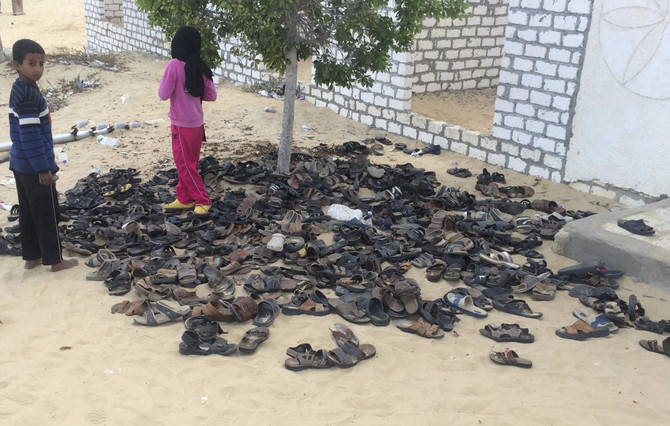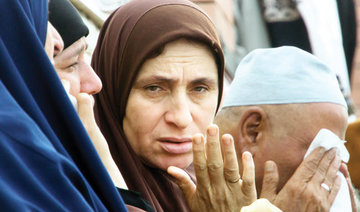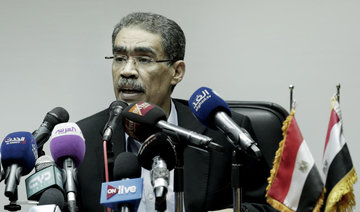JEDDAH: The Organization of Islamic Cooperation’s Independent Permanent Human Rights Commission (IPHRC) has said it is appalled by the “horrific” bomb and gun assault on a mosque in Egypt’s north Sinai on Friday.
It also attacked the mass media in deploring the “negative stereotyping” of Islam and Muslims. In the attack on Al-Rawdah Mosque, condemned by the commission as “one of the deadliest attacks in Egypt’s modern history,” at least 300 people were killed and 128 injured.
“IPHRC unreservedly condemns this dastardly act of terrorism and extends its heartfelt condolences to the government and people of Egypt in general and grieved families in particular,” it said in a statement.
“Fashionable as it has become, every time an act of terror occurs, we see Islam and Muslims are being negatively stereotyped in the mass media and (by) far-right groups,” the statement said.
“However, this attack, which is one of the numerous being carried out daily against Muslims in an Islamic country, illustrates how Muslims continue to suffer from the double jeopardy of being themselves the victims of the terrorist attacks and simultaneously the targets of Islamophobic acts fomented by slanted media reporting and statements of the political demagogues.”
The IPHRC reiterated its view that such barbaric attacks by any group professing deviant ideologies have no sanction in the religion of Islam, which forbids terrorism and the targeting of innocent civilians under any circumstances.
It urged the Egypt government and the international community to continue to take all measures to effectively combat terrorism in all its forms and manifestations.
While condemning these “despicable inhuman acts of cowardice,” IPHRC also urged the international community and Muslims all over the world to “commit to the values of pluralism and tolerance, which remains the best defense against those who are committed to turning communities against each other.”
The commission also stressed the need to highlight the message that a “clash of civilizations” is not between religions and races but between “those who stand for hate and divisiveness on the one hand, and those who stand for mutual respect and peaceful co-existence, on the other.”
OIC body condemns ‘horrific’ Sinai attack
OIC body condemns ‘horrific’ Sinai attack

Parliamentary Foreign Vice-Minister Matsumoto to visit Saudi Arabia, Jordan

TOKYO: Japan’s Parliamentary Vice-Minister for Foreign Affairs Matsumoto Hisashi will visit the Kingdom of Saudi Arabia and Jordan from Jan. 11 to 15, the foreign ministry said on Friday.
During the visit, Matsumoto is scheduled to exchange views with government officials of Saudi Arabia and Jordan on bilateral relations as well as regional and international situations.
Matsumoto is scheduled to arrive in Riyadh on Jan. 12, according to the ministry.
A version of this article appeared on Arab News Japan.
Lebanon PM to visit new Damascus ruler on Saturday

- Lebanon’s Prime Minister Najib Mikati will on Saturday make his first official trip to neighboring Syria since the fall of president Bashar Assad, his office told AFP
Mikati’s office said Friday the trip came at the invitation of the country’s new de facto leader Ahmed Al-Sharaa during a phone call last week.
Syria imposed new restrictions on the entry of Lebanese citizens last week, two security sources have told AFP, following what the Lebanese army said was a border skirmish with unnamed armed Syrians.
Lebanese nationals had previously been allowed into Syria without a visa, using just their passport or ID card.
Lebanon’s eastern border is porous and known for smuggling.
Lebanese Shiite group Hezbollah supported Assad with fighters during Syria’s civil war.
But the Iran-backed movement has been weakened after a war with Israel killed its long-time leader and Islamist-led rebels seized Damascus last month.
Lebanese lawmakers elected the country’s army chief Joseph Aoun as president on Thursday, ending a vacancy of more than two years that critics blamed on Hezbollah.
For three decades under the Assad clan, Syria was the dominant power in Lebanon after intervening in its 1975-1990 civil war.
Syria eventually withdrew its troops in 2005 under international pressure after the assassination of Lebanese ex-prime minister Rafic Hariri.
UN says 3 million Sudan children facing acute malnutrition

- Famine has already gripped five areas across Sudan, according to a report last month
- Sudan has endured 20 months of war between the army and the paramilitary forces
PORT SUDAN, Sudan: An estimated 3.2 million children under the age of five are expected to face acute malnutrition this year in war-torn Sudan, according to the United Nations Children’s Fund (UNICEF).
“Of this number, around 772,000 children are expected to suffer from severe acute malnutrition,” Eva Hinds, UNICEF Sudan’s Head of Advocacy and Communication, told AFP late on Thursday.
Famine has already gripped five areas across Sudan, according to a report last month by the Integrated Food Security Phase Classification (IPC), a UN-backed assessment.
Sudan has endured 20 months of war between the army and the paramilitary Rapid Support Forces (RSF), killing tens of thousands and, according to the United Nations, uprooting 12 million in the world’s largest displacement crisis.
Confirming to AFP that 3.2 million children are currently expected to face acute malnutrition, Hinds said “the number of severely malnourished children increased from an estimated 730,000 in 2024 to over 770,000 in 2025.”
The IPC expects famine to expand to five more parts of Sudan’s western Darfur region by May — a vast area that has seen some of the conflict’s worst violence. A further 17 areas in western and central Sudan are also at risk of famine, it said.
“Without immediate, unhindered humanitarian access facilitating a significant scale-up of a multisectoral response, malnutrition is likely to increase in these areas,” Hinds warned.
Sudan’s army-aligned government strongly rejected the IPC findings, while aid agencies complain that access is blocked by bureaucratic hurdles and ongoing violence.
In October, experts appointed by the United Nations Human Rights Council accused both sides of using “starvation tactics.”
On Tuesday the United States determined that the RSF had “committed genocide” and imposed sanctions on the paramilitary group’s leader.
Across the country, more than 24.6 million people — around half the population — face “high levels of acute food insecurity,” according to IPC, which said: “Only a ceasefire can reduce the risk of famine spreading further.”
Turkiye says France must take back its militants from Syria

- Ankara is threatening military action against Kurdish fighters in the northeast
- Turkiye considers the Kurdish-led Syrian Democratic Forces as linked to its domestic nemesis
ISTANBUL: France must take back its militant nationals from Syria, Turkiye’s top diplomat said Friday, insisting Washington was its only interlocutor for developments in the northeast where Ankara is threatening military action against Kurdish fighters.
Foreign Minister Hakan Fidan insisted Turkiye’s only aim was to ensure “stability” in Syria after the toppling of strongman Bashar Assad.
In its sights are the Kurdish-led Syrian Democratic Forces (SDF) which have been working with the United States for the past decade to fight Daesh group militants.
Turkiye considers the group as linked to its domestic nemesis, the Kurdistan Workers Party (PKK).
The PKK has waged a decades-long insurgency in Turkiye and is considered a terror organization by both Turkiye and the US.
The US is currently leading talks to head off a Turkish offensive in the area.
“The US is our only counterpart... Frankly we don’t take into account countries that try to advance their own interests in Syria by hiding behind US power,” he said.
His remarks were widely understood to be a reference to France, which is part of an international coalition to prevent a militant resurgence in the area.
Asked about the possibility of a French-US troop deployment in northeast Syria, he said France’s main concern should be to take back its nationals who have been jailed there in connection with militant activity.
“If France had anything to do, it should take its own citizens, bring them to its own prisons and judge them,” he said.
Lebanese caretaker PM says country to begin disarming south Litani to ensure state presence

- Najib Mikati: ‘We are in a new phase – in this new phase, we will start with south Lebanon and south Litani’
DUBAI: Lebanese caretaker Prime Minister Najib Mikati said on Friday that the state will begin disarming southern Lebanon, particularly the south Litani region, to establish its presence across the country.
“We are in a new phase – in this new phase, we will start with south Lebanon and south Litani specifically in order to pull weapons so that the state can be present across Lebanese territory,” Mikati said.




















